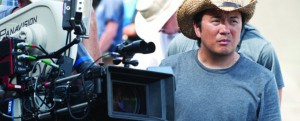University degrees: Postgraduate
Course length: 2 years full-time
Course city: Los Angeles
The Master of Fine Arts degree in Production with an emphasis in directing is a three- to four-year program designed to develop artists in film, television and digital media. For more than half a century we have trained students in all the arts and crafts of media production while expanding their understanding of the critical, theoretical and historical components of these art forms. Our goal is to infuse the highest standards of craftsmanship with imaginative freedom and a sense of social responsibility. Alumni include Francis Ford Coppola (The Godfather), Alexander Payne (Nebraska, The Descendants), Alex Gibney (Going Clear, Taxi to the Dark Side), Alison Anders (Mi Vida Loca, Gas, Food, Lodging), Julie Dash (Daughters of the Dust), Charles Burnett (To Sleep With Anger, Killer of Sheep), Justin Lin (Better Luck Tomorrow, Fast and Furious 6, Star Trek Beyond), Caveh Zahedi (The Sheik and I, I Am a Sex Addict) and cinematographer Dagmar Weaver-Madsen (10,000 km, Unexpected).
THE ART OF COLLABORATION
The first year of the program is an intensive workshop in the collaborative process of production that culminates in each student completing two short films. The curriculum includes screenwriting, directing narrative and documentary, cinematography, editing, post production and production planning.
WORKING CLOSELY WITH A FACULTY MENTOR ON AN ADVANCED PROJECT
The second year of the program provides for further development of the student-mentor relationship as the student writes, directs and completes an advanced project in narrative, documentary, digital media or experimental film, while taking critical studies and advanced craft courses.
THESIS PRODUCTION LAUNCHED IN THIRD YEAR
The third year, students begin work on their thesis production, which must be completed no later than the end of the fourth year. It is possible to complete the thesis at the end of the third year, based on the scope of the project. Thesis productions can be in documentary or narrative form.
The Directing Program has a 12-quarter time-to-degree requirement. The minimum total units required to graduate is 72 units (18 courses). Only 16 units of FTV 596ABC may be applied towards the total course requirement and only eight of these may be applied towards the minimum graduate course requirement. Only four units of 596A and four units of 596B may be taken prior to advancement. FTV596D though F may be taken after advancement.
III. Courses
A. Required Courses:
FIRST YEAR CURRICULUMFall Quarter
Winter Quarter
Spring Quarter
SECOND YEAR
SECOND OR THIRD YEAR
B. FTVDM Elective Requirement:
TWO CINEMA AND MEDIA STUDIES SEMINARS, one must be completed no later than the quarter you advance to candidacy (list of courses below), and ONE OTHER COURSE in the department that is outside of the Production program (animation, screenwriting or producers program). Seminar courses that are approved to fulfill the Cinema and Media Studies requirement:
Plus choose one course below:
Please note that not all courses are offered every quarter. Students should consult the registrar’s schedule for available courses and class times. For courses in the 298 series, students should consult the graduate advisor first to check whether a course fulfills the CMS requirement.
**These courses are sometimes taught as a core course for M.A. students and may not be available that particular quarter for MFA students.
** courses are sometimes taught as a core course for MA students and may not be available that particular quarter to MFA students.
PROGRAM FOCUS
A. FIRST YEAR: A FOCUS ON PROCESS
The first year is a highly intensive program operating on a six-day schedule with the regularly scheduled courses enhanced by all-day technical craft training on Saturdays. The first quarter provides basic background in video, cinematography, sound, editing, the directing of actors and the camera, the organizing of production, and short fiction screenwriting. The second and third quarters are devoted to intensive production work focusing on process leading to six minute sync sound film with clearly defined parameters that must be completed during the academic year if a student is to continue in the program. Two evaluation sessions with the first year faculty will be required of all students. The first will occur at the end of Fall Quarter. The second, a First Year Review, will take place at the end of the spring quarter with the purposes of determining fitness to continue in the program, advising on curriculum for second year professional training, and the selection of Second Year Advisors.
B. SECOND YEAR: A FOCUS ON PROFESSIONAL TRAINING
Second year training is intended to develop professional skills. Courses are constructed around two pivots: 1. Mentor relationships established by students with their Second Year Advisors involving multi-quarter course sequences in the specialized areas of: Narrative Film, Documentary, Multicamera Television Production, Experimental Media and Cinematography. 2. Advanced training in various areas of the craft enhanced by critical studies courses. All projects begun during the second year associated with any of these courses must be completed no later than the middle of the eighth quarter of residency.
C. THIRD YEAR: A FOCUS ON PRODUCTION EXPERIENCE
Third year training is committed to the planning and production of a Thesis Film (no more than 30 minutes). The Thesis process involves the following elements: 1. Extensive pre-production planning prior to advancing to candidacy. FTV 486 is available for a student to work with a faculty in preparation to advance. 2. Specialized craft courses and critical study courses can continue to be taken based on the needs of the individual student, but should not impede progress on the thesis. 3. * Advancement to candidacy must take place by the winter quarter at latest. 4. *Advancement to candidacy will be based on a signed contract clearly defining the parameters of the project including budget, time line, film length, and advising procedures.
D. FOURTH YEAR: COMPLETION
The fourth year is used for completion of the thesis project. The twelve-quarter limit will be strictly enforced.
